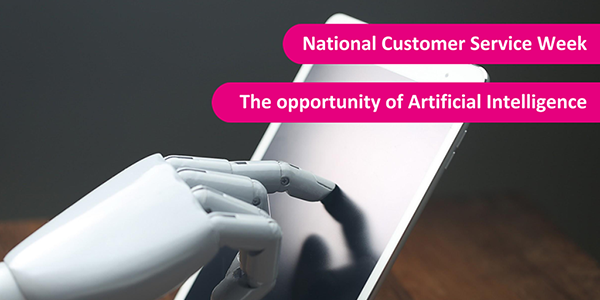National Customer Service Week: The opportunity of Artificial Intelligence

We’re now part way through National Customer Service Week (NCSW), which provides the industry in the US and UK with the chance to take stock, celebrate success and share best practice. It is a great opportunity to demonstrate how customer service, and customer experience, has grown to become business-critical for organisations, whatever industry sector they are in.
However, as well as celebrating current successes, NCSW provides a chance to pause and to look forward - what will customer service be like in the future? In particular, the rise of artificial intelligence (AI) is poised to transform customer service, and now is a good time to look at the opportunities and threats it provides to the sector. Recent research by analyst ContactBabel points to a drop in the number of inbound queries between 2015 and 2016. Combined with the growth of AI this has led to much talk about whether we are going to see the end of the traditional contact center, with agents replaced by machines.
So what are the opportunities and threats of AI when it comes to the contact center? From our experience here at Eptica there are five conclusions that can be drawn:
1. Automating low value conversations
Despite the widespread use of technologies such as self-service, a large number of low value interactions currently still involve people. This could be because particular brands haven’t yet deployed self-service or due to consumers not being able to find the answers to their queries by themselves. Whatever the reason, low value interactions, such as asking “How do I return my purchase to you?” or “How do I change my address?” add to agent workloads, take time to answer and add up to a significant drain on resources. Automating these transactions through AI benefits everyone - consumers get faster, more consistent answers, while businesses can focus resources on more value added areas.
2. Focus agents where they are needed
While some might see automation through AI as a threat to agent jobs, it actually provides an opportunity. Rather than dealing with basic, routine queries, it frees up their time to handle more complex interactions, where human skills such as empathy and personalization are vital. This delivers a more engaging, varied and interesting work day for agents, where they really feel they can make a difference. Given the crucial importance of customer experience to differentiating businesses from their rivals, the need for human customer service is only likely to grow.
3. Empower staff through AI
Human customer service will also be supported by AI. For example, technology can analyze incoming interactions and automatically provide vital information (such as previous contacts) to the agent, while Natural Language Processing (NLP) can extract contextual data, such as tone of voice, even from digital messages like email or social media. This empowers the agent to focus on using their personal skills to build empathy and understanding, augmenting their abilities to provide a more complete response.
4. Changing roles in the contact center
All of this means that the role of the agent will change. It will be much more important, as staff will be dealing with high value, meaningful conversations with customers that are truly central to business success. It will be more challenging for agents, and will require them to potentially learn new skills, but overall they will have a role that is more fulfilling and a job that is more valued in their organisation.
When looking at the impact of AI on customer service it is worth looking at the results of previous technology transformations. Take communications in business. The advent of desktop computers saw the role of typists and secretaries change dramatically. The need for communication didn’t go away, it split, with computers automating much of the process, such as replacing the manual printing and sending of paper letters with email, while the role of the secretary evolved into that of personal assistant (PA), responsible for a wider range of activities and with a higher status in the organisation.
Looking ten years down the line, I’m sure we’ll still be celebrating National Customer Service Week, with an industry that balances humans and technology to deliver a better, more meaningful experience to both consumers and staff, benefiting both sides by empowering them through artificial intelligence.







Comments